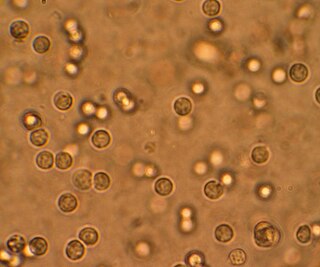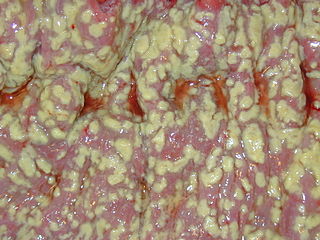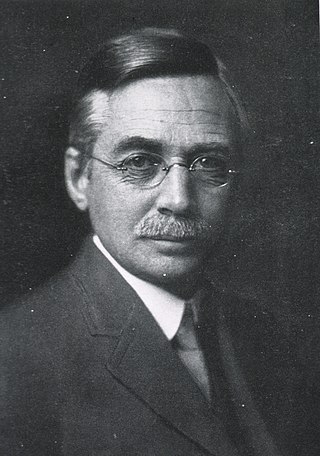
A urinary tract infection (UTI) is an infection that affects part of the urinary tract. When it affects the lower urinary tract it is known as a bladder infection (cystitis) and when it affects the upper urinary tract it is known as a kidney infection (pyelonephritis). Symptoms from a lower urinary tract infection include pain with urination, frequent urination, and feeling the need to urinate despite having an empty bladder. Symptoms of a kidney infection include fever and flank pain usually in addition to the symptoms of a lower UTI. Rarely the urine may appear bloody. In the very old and the very young, symptoms may be vague or non-specific.

Infectious mononucleosis, also known as glandular fever, is an infection usually caused by the Epstein–Barr virus (EBV). Most people are infected by the virus as children, when the disease produces few or no symptoms. In young adults, the disease often results in fever, sore throat, enlarged lymph nodes in the neck, and fatigue. Most people recover in two to four weeks; however, feeling tired may last for months. The liver or spleen may also become swollen, and in less than one percent of cases splenic rupture may occur.

The British National Formulary (BNF) is a United Kingdom (UK) pharmaceutical reference book that contains a wide spectrum of information and advice on prescribing and pharmacology, along with specific facts and details about many medicines available on the UK National Health Service (NHS). Information within the BNF includes indication(s), contraindications, side effects, doses, legal classification, names and prices of available proprietary and generic formulations, and any other notable points. Though it is a national formulary, it nevertheless also includes entries for some medicines which are not available under the NHS, and must be prescribed and/or purchased privately. A symbol clearly denotes such drugs in their entry.

Norovirus, sometimes referred to as the winter vomiting disease, is the most common cause of gastroenteritis. Infection is characterized by non-bloody diarrhea, vomiting, and stomach pain. Fever or headaches may also occur. Symptoms usually develop 12 to 48 hours after being exposed, and recovery typically occurs within one to three days. Complications are uncommon, but may include dehydration, especially in the young, the old, and those with other health problems.

Clostridioides difficile infection , also known as Clostridium difficile infection, is a symptomatic infection due to the spore-forming bacterium Clostridioides difficile. Symptoms include watery diarrhea, fever, nausea, and abdominal pain. It makes up about 20% of cases of antibiotic-associated diarrhea. Antibiotics can contribute to detrimental changes in gut microbiota; specifically, they decrease short-chain fatty acid absorption which results in osmotic, or watery, diarrhea. Complications may include pseudomembranous colitis, toxic megacolon, perforation of the colon, and sepsis.

Klebsiella pneumoniae is a Gram-negative, non-motile, encapsulated, lactose-fermenting, facultative anaerobic, rod-shaped bacterium. It appears as a mucoid lactose fermenter on MacConkey agar.

A hospital-acquired infection, also known as a nosocomial infection, is an infection that is acquired in a hospital or other healthcare facility. To emphasize both hospital and nonhospital settings, it is sometimes instead called a healthcare-associated infection. Such an infection can be acquired in hospital, nursing home, rehabilitation facility, outpatient clinic, diagnostic laboratory or other clinical settings. A number of dynamic processes can bring contamination into operating rooms and other areas within nosocomial settings. Infection is spread to the susceptible patient in the clinical setting by various means. Healthcare staff also spread infection, in addition to contaminated equipment, bed linens, or air droplets. The infection can originate from the outside environment, another infected patient, staff that may be infected, or in some cases, the source of the infection cannot be determined. In some cases the microorganism originates from the patient's own skin microbiota, becoming opportunistic after surgery or other procedures that compromise the protective skin barrier. Though the patient may have contracted the infection from their own skin, the infection is still considered nosocomial since it develops in the health care setting. Nosocomial infection tends to lack evidence that it was present when the patient entered the healthcare setting, thus meaning it was acquired post-admission.
Infection prevention and control is the discipline concerned with preventing healthcare-associated infections; a practical rather than academic sub-discipline of epidemiology. In Northern Europe, infection prevention and control is expanded from healthcare into a component in public health, known as "infection protection". It is an essential part of the infrastructure of health care. Infection control and hospital epidemiology are akin to public health practice, practiced within the confines of a particular health-care delivery system rather than directed at society as a whole.

Weston General Hospital is an NHS district general hospital in the town of Weston-super-Mare, Somerset, England, operated by University Hospitals Bristol and Weston NHS Foundation Trust. As of June 2019, the hospital had 261 beds and around 1,800 clinical and non-clinical staff. It has a part-time Accident & Emergency department, an intensive care unit, an oncology and haematology day unit, and a day case unit. The hospital also has a 12-bed private unit, The Waterside Suite, wholly owned by the hospital trust, with profits being re-invested into the main hospital.
Infection Control & Hospital Epidemiology is a peer-reviewed medical journal published by Cambridge University Press. It publishes research on control and evaluation of the transmission of pathogens in healthcare institutions and on the use of epidemiological principles and methods to evaluate and improve the delivery of care, including infection control practices, surveillance, cost-benefit analyses, resource use, occupational health, and regulatory issues. The journal is published for the Society for Healthcare Epidemiology of America.
Graham Arthur John Ayliffe was a British medical microbiologist and Emeritus Professor in Medical Microbiology, University of Birmingham, United Kingdom. He was instrumental in founding the International Federation for Infection Control (IFIC) in association with the World Health Organization (WHO) in 1987. He was elected Chair in 1990. He was also a founder member of the Hospital Infection Society and editor of its journal (1980–84), a former Chair (1980–84) and President (1988–94). The Graham Ayliffe Training Fellowship was established in 2013.

Candida auris is a species of fungus that grows as yeast. It is one of the few species of the genus Candida which cause candidiasis in humans. Often, candidiasis is acquired in hospitals by patients with weakened immune systems. C. auris can cause invasive candidiasis (fungemia) in which the bloodstream, the central nervous system, and internal organs are infected. It has attracted widespread attention because of its multiple drug resistance. Treatment is also complicated because it is easily misidentified as other Candida species.
Daljeet Singh Gambhir is an Indian cardiologist, medical academic, researcher and inventor and the Group Director of Cardiology at Kailash Group of Hospitals and Heart Institute, Delhi. He is the inventor of Infinnium Paclitaxel-Eluting Stent, a reportedly cheaper drug-eluting stent which he first presented at the EuroPCR meeting held in Paris in 2003. A fellow of the National Academy of Medical Sciences and an honorary fellow of the Indian College of Cardiology, he is reported to have performed over 10,000 coronary interventions. The Government of India awarded him the fourth highest civilian honour of the Padma Shri, in 2016, for his contributions to medicine.
Thoguluva Shesadri Chandrasekar is an Indian gastroenterologist and the founder chairman of Medindia Hospitals, a healthcare facility based in Chennai. He is credited with the performance of over 23,000 endoscopy procedures and is known for the Braille chart on personal hygiene he prepared in 2015 for the visually impaired people. The Government of India awarded him the fourth highest civilian honour of the Padma Shri, in 2016, for his contributions to medicine.
The American Journal of Infection Control is a peer-reviewed scientific journal published by Elsevier on behalf of the Association for Professionals in Infection Control and Epidemiology. The journal publishes articles describing original research on the epidemiology, infection control, and infectious diseases. According to the 2020 Journal Citation Reports, the journal has a 2020 impact factor of 2.95.
Harbhajan Singh Rissam (1951–2013) was an Indian interventional cardiologist, philanthropist and writer, known for his medical service and his novel based on medical profession. He was the director of cardiac clinical services at Max Healthcare, Delhi and his maiden novel, The Scalpel - Game Beneath, the first book of a proposed trilogy published in 2010, is a medical thriller on the medicine mafia. The Government of India awarded him the fourth highest civilian honour of the Padma Shri, in 2006, for his contributions to medical science.

Conor P. Delaney MD, MCh, PhD, FRCSI, FACS, FASCRS, FRCSI (Hon.) is an Irish-American colorectal surgeon, CEO and President of the Cleveland Clinic Florida, the Robert and Suzanne Tomsich Distinguished Chair in Healthcare Innovation, and Professor of Surgery at the Cleveland Clinic Lerner College of Medicine. He is also the current President of the American Society of Colon and Rectal Surgeons (ASCRS). He was previously Chairman of the Digestive Disease & Surgery Institute at the Cleveland Clinic. He is both a Fellow and Honorary Fellow of the Royal College of Surgeons in Ireland and a Fellow of both the American College of Surgeons and American Society of Colon and Rectal Surgeons.

Ludvig Hektoen was an American pathologist known for his work in the fields of pathology, microbiology and immunology. Hektoen was appointed to the National Academy of Sciences in 1918, and served as president of many professional societies, including the American Association of Immunologists in 1927 and the American Society for Microbiology in 1929. He was the founding editor of the Archives of Pathology and Laboratory Medicine in 1926 and edited several other medical journals. He was knighted to the Order of St. Olav in 1929, and in 1933, he became professor emeritus of pathology at the University of Chicago. The Hektoen Institute for Medical Research—formerly the John McCormick Institute of Infectious Diseases—now bears his name.

Dale Andrew Fisher FRACP is an Australian physician who specialises in Infectious Diseases and is a Senior Consultant in the Division of Infectious Diseases at the National University Hospital, Singapore. He is also a professor of medicine at the Yong Loo Lin School of Medicine, National University of Singapore, the chair of the National Infection Prevention and Control Committee through the Ministry of Health, Singapore, and chair of the steering committee of the Global Outbreak Alert and Response Network hosted by the World Health Organization.
Catherine Jane Noakes is a British mechanical engineer who is Professor of Environmental Engineering for Buildings at the University of Leeds. Noakes specialises in airborne infections and the transport of airborne pathogens. During the COVID-19 pandemic, Noakes served on the Government of the United Kingdom Scientific Advisory Group for Emergencies (SAGE).












